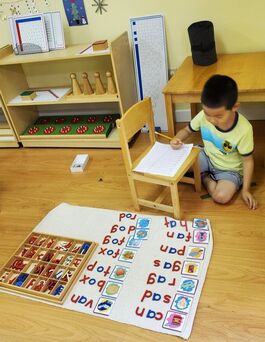Language Area

The Montessori language program is a systematic way for the child to experience language in the environment. This is very important for these young children, for they need to experience their environment in a meaningful way in order to understand and internalize it. The exercises we offer at this developmental stage are keys to the various aspects of language which open the door for ongoing explorations. Through observations of children, Dr. Montessori came to see the development of language in three distinct but related stages, which are spoken language, written language and reading. Each level requires a tremendous amount of internal and external efforts on behalf of the child. If done properly the combination of this work allows the child to fluent in self-expression.
Of the three components of language, spoken, written and reading, spoken language is the pre-requisite to the other two. The construction of spoken language is the primary foundation of any achievements that might follow in the other aspects for language. It is introduced in the preliminary language category, given in three groups of exercises. The exercises in spoken language serve to give the child ideas and the proper vocabulary to express those ideas. These exercises broaden the child’s vocabulary and offer concrete examples that give true meaning to the words given to the child. This is done by creating an environment that sparks the child’s interests and encourages speech.
Writing is the ability to express ones thoughts through the use of written symbols. It is the process of forming a logical thought, breaking each word of the thought into its component sounds, and putting the symbols down for each sound. There are three things that are needed in order to write. As such, proper writing requires:
· Full comprehension of one’s own thoughts.
· Recognition of the graphic symbols translated to it corresponding sounds. (In English language there are 26 symbols.)
· Process of analyzing the sounds within the word.
As writing is not a gift of nature but rather a combination of training, Dr. Montessori worked to develop a number of indirect preparations to develop the children’s minds and hands.
In our language area there are many possibility of exploration open to the child once he begins to read. In Montessori language curriculum, we use the phonetic approach for reading. Phonetics means representing the sounds of speech with a set of distinctive symbols each denoting a single sound. Parallel to this work, we also have books in the library for children to read stories they enjoy about the related aspects of the world. Children will be lead to a series of exercises that will bring a greater understanding of the structure of language.
Of the three components of language, spoken, written and reading, spoken language is the pre-requisite to the other two. The construction of spoken language is the primary foundation of any achievements that might follow in the other aspects for language. It is introduced in the preliminary language category, given in three groups of exercises. The exercises in spoken language serve to give the child ideas and the proper vocabulary to express those ideas. These exercises broaden the child’s vocabulary and offer concrete examples that give true meaning to the words given to the child. This is done by creating an environment that sparks the child’s interests and encourages speech.
Writing is the ability to express ones thoughts through the use of written symbols. It is the process of forming a logical thought, breaking each word of the thought into its component sounds, and putting the symbols down for each sound. There are three things that are needed in order to write. As such, proper writing requires:
· Full comprehension of one’s own thoughts.
· Recognition of the graphic symbols translated to it corresponding sounds. (In English language there are 26 symbols.)
· Process of analyzing the sounds within the word.
As writing is not a gift of nature but rather a combination of training, Dr. Montessori worked to develop a number of indirect preparations to develop the children’s minds and hands.
In our language area there are many possibility of exploration open to the child once he begins to read. In Montessori language curriculum, we use the phonetic approach for reading. Phonetics means representing the sounds of speech with a set of distinctive symbols each denoting a single sound. Parallel to this work, we also have books in the library for children to read stories they enjoy about the related aspects of the world. Children will be lead to a series of exercises that will bring a greater understanding of the structure of language.
